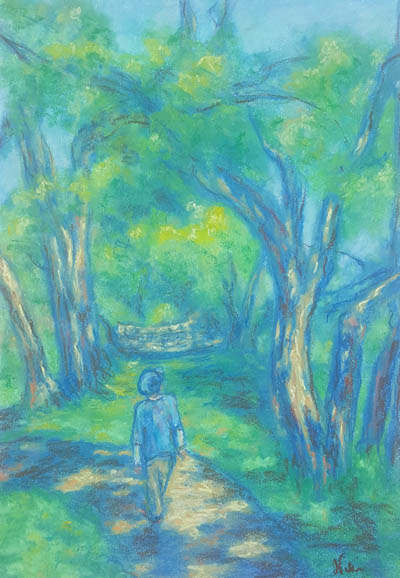I don’t really have a bucket list, but if I did, cataract surgery would not have been on that list!

“His Own Path” pastel on paper
It started with cloudy vision in the lower half of one eye–which quickly progressed to the whole eye. I went in, had my eyes dilated for the first time ever, and within a couple of hours was scheduling surgery for a cataract in one eye.
No big deal, I told myself. It’s one of the oldest and safest surgeries to have. I would be in and out within a couple of hours. Even Monet had cataract surgery! I spent a fair amount of time looking up what other artists experienced with cataracts, and the consensus seemed to be that cataract surgery would be a positive move.
As my vision continued to worsen, I tried to cope– stopped driving, stopped painting, focused on gardening and sewing (I’ve spent so many nights up late sewing, I can actually do it with my eyes closed at times!) I taught a wonderful children’s class on writing and illustration, which pushed my surgery back a couple of weeks.
Since I love to paint, I always figured that nothing would stop me from painting. I was wrong. It was so distressing not to be able to clearly see what I was doing with both eyes, I put it away. I told myself that it was because I knew this would be a temporary hiatus, but deep down I was worried– what would I do if I had permanent vision loss? My eyesight’s always been terrible, but I see fine with glasses or contacts. Not being able to see bright colors, light and shadow, my children’s sparkly eyes– I hadn’t realized how dependent on these small joys I am until this summer. 

“Blue Morning,” pastel on paper– the last piece I attempted before the surgery (went back and finished it afterward)
As for the surgery, it was quite manageable– they used twilight sleep instead of full anesthesia, and I didn’t feel any pain. My vision adjusted each day (I was a little afraid the first day, as the colors were intense enough to give me nausea!) Within a week or so my vision was about the same in both eyes again. If you wear contacts, you do have to wait a month or two before you can put one in your eye again. The prescription drops are expensive and annoying (several times a day the first week!)
I began drawing and painting again within a couple of weeks, but waited almost a month to use pastel because of the dust. I’m still adjusting to my vision changes (you basically have to decide on up-close or distance vision, unless you choose a multi-focal lens, which also comes with vision changes!)
My vision will never be the same as it was before the cataract, but I feel like it’s close–since my cataract wasn’t age-related, I’m guessing I’ll get to go through this experience again later in life. In the meantime, I’ll be diving back into painting and teaching– and learning to enjoy some hobbies that don’t leave me quite as dependent on my eyes.
One last tip: have the person driving you to your post-op appointment the day after your surgery check your outfit. I didn’t realize until I had been sitting in the waiting room for a while that my shirt was on inside out.
If you’re in the area and would like to come to an art workshop for the whole family, check out our schedule: http://www.stsfallbrook.com/family-art-workshop/
Click here to see my gallery Daily Paintworks!
15 Comments